Thailand's army seized control of the country and suspended the constitution on Thursday after rival factions failed in talks to end six months of political turmoil, causing the nation's 19th coup in 82 years.
General Prayuth Chan-ocha, head of the army and now acting prime minister, did not use the word "coup" in his televised announcement to the nation but declared the takeover was necessary "in order for the country to return to normality quickly, and for society to love and be at peace again".
He added: "We ask the public not to panic and to carry on their lives normally."
On Friday the general summoned members of the politically pivotal Shinawatra family to a meeting. Yingluck Shinawatra was forced from office as caretaker prime minister earlier in the month by a court ruling; her brother, Thaksin, was ousted as prime minister by the military in 2006 and opponents argue the family exercises a corrupt grip on Thai politics that must be broken.
The Reuters news agency said Yingluck Shinawatra and the general were seen arriving on Friday at an army facility, while the army announced it had banned 155 people including politicians and activists from leaving the country "in order to maintain peace and resolve the conflict".
The surprise announcement of a full military takeover followed the unexpected late-night invocation of martial law on Tuesday, which the army said was not a coup but merely a peacekeeping move to "restore order" in a nation beleaguered by political in-fighting.
The US secretary of state, John Kerry, in a strongly worded statement warning that the takeover would "have negative implications for the US-Thai relationship", openly condemned Prayuth's move and said: "There is no justification for this military coup."
He added: "I urge the restoration of civilian government immediately, a return to democracy, and respect for human rights and fundamental freedoms, such as press freedoms. The path forward for Thailand must include early elections that reflect the will of the people."
Bangkok's road traffic increased Thursday evening after the military announced a nationwide 10pm-5am curfew. Many people stocked up on essentials at supermarkets and small shops.
The army also banned public gatherings of five or more people, suspended all television and radio stations (which are permitted to play only military signals), and established a special unit to monitor social media comment.
Rival political factions have spent the past two days at Bangkok's Army Club, where they attempted to come to a compromise over the future of the country.
The coup became apparent during Thursday's negotiations when Prayuth asked the caretaker justice minister, Chaikasem Nitisiri, whether the government was ready to resign.
"As of this minute, the government will not resign," Chaikasem allegedly answered, according to the English-language Nation newspaper.
"So, as of this minute, I decide to seize ruling power," Prayuth retorted.
An electoral commissioner who was at the negotiations said that Prayuth had told the assembled company: "Everyone must sit still."
Rumours of a possible coup had been circulating since November, when anti-government protesters first took to the streets to demand the resignation of the incumbent Pheu Thai party. But Prayuth's seemingly sudden decision on Thursday – in the midst of negotiations between rival political groups – took many by surprise.
"The army clearly had no sincerity in brokering talks," said Michael Connors, a south-east Asia expert and associate professor at the Malaysia campus of the University of Notthingham. "In retrospect [the coup] must have been calculated, and it looks like the [declaration of] martial law was just a pretext to deliver a strategic advantage to the coup group."
Despite options reportedly being floated at the Prayuth-mediated talks at the Army Club no agreement was reached, although the rival leaders did tweet "selfie" pictures of themselves smiling and laughing together at the round-table discussions.
All that changed, however, when hundreds of extra troops arrived at the venue and took away the leader of the anti-government protests, Suthep Thaugsuban.
Various other leaders have also been detained, including members of the opposition party, of the Pheu Thai government, plus members of the pro-government Red Shirts and anti-government People's Democratic Reform Committee (PDRC).
Thailand's caretaker prime minister, Niwutthamrong Boonsongpaisan, who assumed the role this month after Yingluck Shinawatra was removed from office by a controversial court ruling, was not at the meeting on Thursday and his location was unknown. Rumours that he could have been at the US embassy were denied publicly, and the army asked him to turn himself in.
Prayuth had warned he wanted an end to the political warring that, since November, as anti-government protesters begancalling for a new, appointed, government, has led to the deaths of 28 people and caused injury to more than 700 others.
"This must be resolved swiftly before I retire, otherwise I won't retire," said Prayuth, who is due to step down at the end of September. "I will not allow Thailand to be like Ukraine or Egypt."
The new Peace and Order Maintaining Command, which includes the army, navy and police, will now be in charge of governingthe country. The stated aim is to reform Thailand's economic, political and social structures, Prayuth said, though courts and parliament's upper house will continue as normal.
Chiranuch Premchaiporn, press freedom advocate of the online news outlet Prachatai, told the Associated Press: "Our problems will never be solved if people are not allowed to express their ideas and speak."
The takeover was met with a warning by the Red Shirt activists' group, the United Front for Democracy against Dictatorship (UDD), which vowed retaliationshortly after the televised statement.
"NOW it is COUP – stand by for a retaliation from the UDD," the group tweeted.
Various governments, including those of France and Germany, as well as human rights groups, have condemned the military's move – the 19th coup since absolute monarchy was abolished here in 1932.
"The military's seizure of power has become routine and a sad reality of Thai politics," said Karim Lahidji, of the International Federation for Human Rights. "Two days after it publicly declared that it was not going to stage a coup, the military seized power and plunged Thailand into a deeper political crisis."
The junta warned it would block any social media platforms in the country found to carry content that incited violence or criticised military leaders. In a television bulletin the military urged "co-operation from social media operators and all involved to stop such messages that incite violence, break the law or criticise the coup council".
"If we find any to be in violation we will suspend the service immediately and will summon those responsible for prosecution."
Observers say Thailand's next move will depend on just how well the various factions, and the public, respond to the military takeover.
"This coup looks like many others going back to the 1970s: the language used, the seeming solidarity among the main branches of the security forces," said Michael Montesano, co-coordinator of the Thailand studies programme at Singapore's institute of south-east Asian studies. "They've inherited a mess and how they're going to manage it depends on how much resistance there is to the government that they attempt to install."
Connors said, though, that the fact that there had been so much talk of resistance proved this coup was different from all the others. "They've never had a coup like this, in which this potential of mass resistance is so strong," he said. "It's only imaginable that this coup will be incredibly repressive as a response."
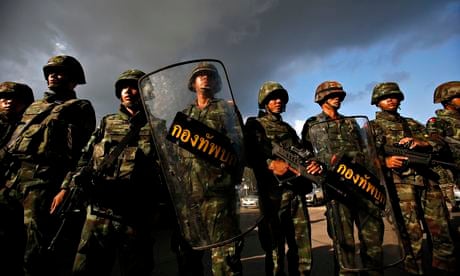
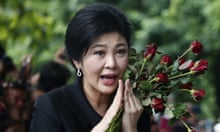

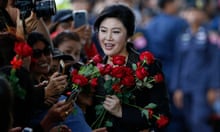


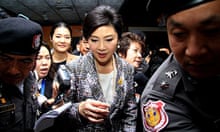
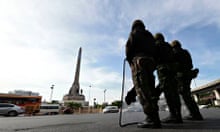
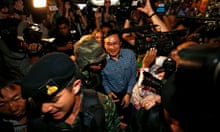
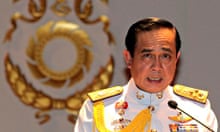
Comments (…)
Sign in or create your Guardian account to join the discussion